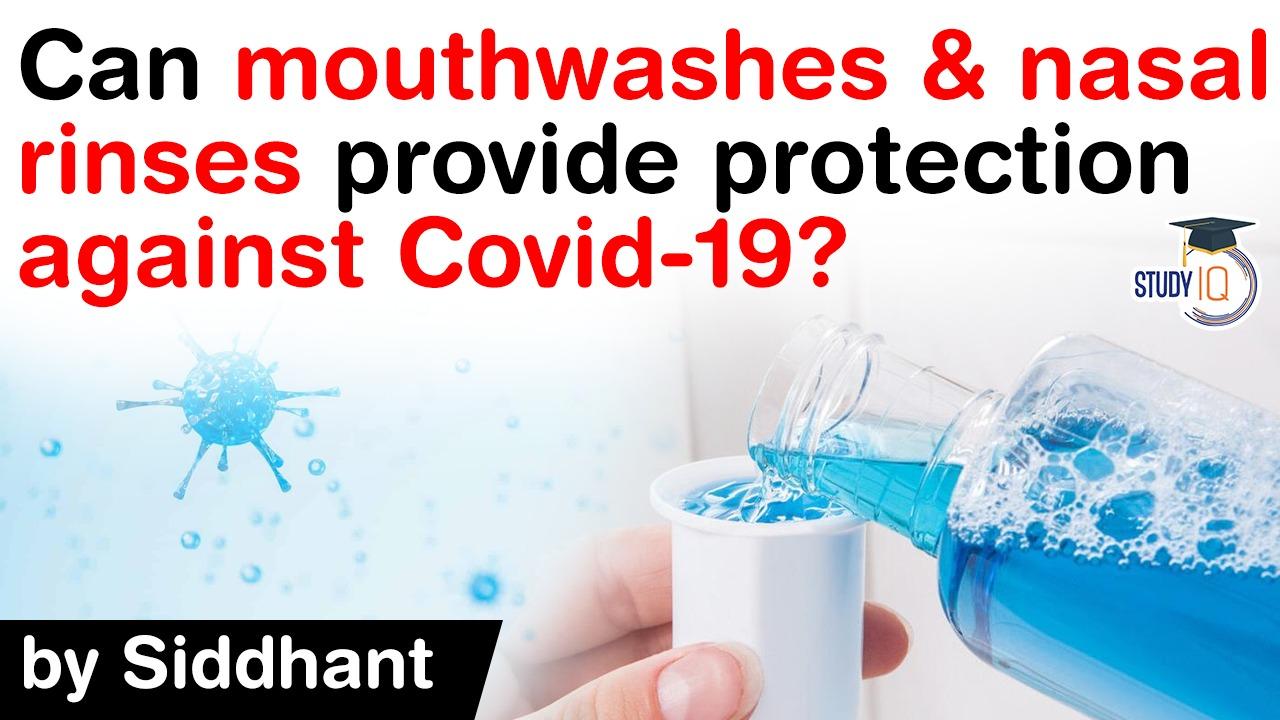Table of Contents
COVID 19
- A study published in the Journal of Medical Virology says that using nasal rinses and mouthwashes, which directly impact the sites of reception and transmission of human coronaviruses (HCoV), may be able to provide an “additional level of protection”. However, the researchers did not conduct their investigation on the novel coronavirus, and there are no indications the products could prevent Covid-19.
- While there are hundreds of coronaviruses that cause diseases in animals, till date only seven types have been identified that infect humans.
Do mouthwashes, nasal rinses prevent human coronaviruses?
- The aim of the investigation was to see whether oral and nasal rinses are able to inactivate the virus, considering the nasal and oral cavities are the major entry points for human coronaviruses.
- It tested a list of products, including Johnson’s Baby Shampoo, Neti Pot, Listerine Antiseptic, Orjael Antiseptic Rinse and Listerine Ultra, on the human coronavirus 229E (more on this below), a common surrogate for SARS-CoV-2.
What were the results of the study?
- The researchers found that Johnson’s Baby Shampoo, a nasal rinse, was able to inactivate more than 99 per cent of the virus in one minute, and more than 99.9 per cent in 2 minutes. Significantly, in the case of this product, a contact time of 30 seconds had variable effects.
- The over-the-counter saline nasal rinse, Neti Pot, had no effect on the infectivity of the virus at any of the incubation times tested by the researchers.
What were the results of the study?
- In the case of oral rinses too, the researchers tested contact times of 30 seconds, 1 and 2 minutes. Three of the oral rinses, that had H2O2 as their active ingredient, demonstrated similar abilities to inactivate the human coronavirus HCoV 229E.
- The product Listerine Antiseptic was able to decrease the infectious virus levels by 99.99 per cent. Researchers also noted that all “Listerine-like” (products with similar active and inactive ingredients) mouthwashes and gargles were able to decrease infectious virus titers by greater than 99 per cent.
What do the findings mean for Covid-19?
- The findings do not have implications for the spread of Covid-19, since the researchers did not test the efficacy of mouthwashes and nasal rinses against SARS-CoV-2. This is because it would have been more expensive, the virus is less available and would have required biosafety level-3 laboratory conditions.
- In the case of Covid-19, there is no evidence that maintaining throat hygiene and practicing gargling regularly can prevent infection.
What is HCoV 229E?
- While there are hundreds of coronaviruses, there are seven that we know can infect humans. Of the seven, two are alpha coronaviruses (229E and NL63) and four are beta coronaviruses (OC43, HKU1, MERS and SARS-CoV). The classification of the viruses is based on their phylogeny, which is to say it reflects how these virus strains evolved from their common ancestors.
- Essentially, this means, whenever a virus newly emerges, its classification depends on how it relates to other known viruses and if it is distinct enough to be called a new species or if it belongs to an existing species. For instance, SARS-CoV and SARS-CoV-2 are genetically linked.
What is HCoV 229E?
- 229E was one of the first coronavirus strains to be described in the mid-60s, possibly by D Hamre and J J Procknow in their 1966 paper titled ‘A new virus isolated from the human respiratory tract’, published in the journal Experimental Biology and Medicine. It is known to cause the common cold.
- According to the US Centers for Disease Control and Prevention (CDC), people around the world commonly get infected by human coronaviruses, including 229E, NL63, OC43 and HKU1.
Latest Burning Issues | Free PDF























 WhatsApp
WhatsApp